NOTICE: This post references card features that have changed, expired, or are not currently available
By Julian, author of Devil’s Advocate…
It’s the end of the year and time to look back at the highs and lows of 2015. For me, the low was eating so much at Christmas dinner that I experienced a phenomenon known as “super belly.” I should be embarrassed, but my family is so used to it that they just look away and hope in vain for next year to be better.
But one of the highs of 2015 was the terrific improvements to Google Flights (see “The Magic of Google Flights“). While it’s not a perfect search engine, it’s become my go-to page for airline flights thanks to its simplicity, speed, and ability to price complex itineraries and build them directly on an airline’s website.
The really great part about Google Flights is that Google continues to make improvements to both the interface and the data on a regular basis. For instance, our friend Grant over at Travel with Grant recently wrote about how some train schedules are now included in Google Flights. Grant’s a good kid, by the way, which is why I’m stealing his image below.
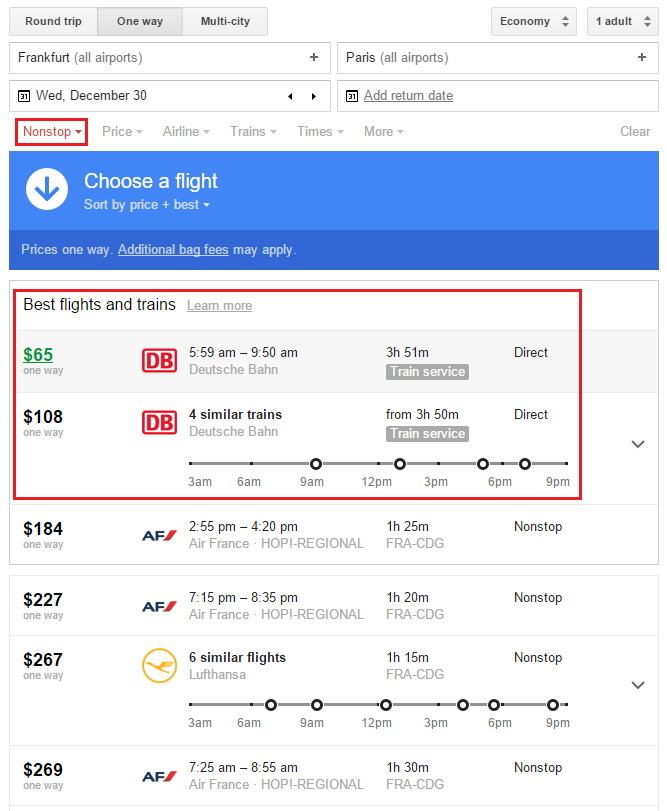
A number of sites have also noted the addition of detailed amenity information to Google Flights, thanks to Google’s partnership with Routehappy. So now Google Flights will tell you about the seat type, Wi-Fi, in-seat power availability, and inflight entertainment options for any given flight.
But in my opinion, one of the least covered improvements is one of the most valuable. I’m talking, of course, about the new airline filter checkboxes.
(Yes, really.)
You may have noticed this change at some point, but you may not realize just how useful this new feature actually is.
The new Google Flights airline filter.
Under the old system, the checkboxes looked like this…
If you clicked the box next to one of the airlines, you’d get only flights with that airline. You could choose more than one airline and get multiple results with the rest of the possibilities filtered out. Pretty straightforward.
But today the checkboxes look like this…
Instead of one box, each airline now has both a checkmark and an “X” option. The checkmark works just like the old checkboxes — to get flights from just one airline, click the appropriate checkmark and your results will be filtered to only that airline.
Nothing revolutionary there. But the “X” boxes are the new twist. Because if you want to exclude an airline from your results, you can do so by simply clicking the “X” box next to that airline.
For instance, after I experienced the wonderousness that is Spirit Airlines (which you can read about in my “Devil’s Advocate Trip Report: Spirit Air A319 Las Vegas to LAX“), I decided to exclude Spirit from my future travel. So when I search for flights on Google Flights, I click the “X” box next to Spirit to make sure no Spirit flights are included in my results.
To codeshare or not to codeshare?
Now that’s all very useful, though perhaps not that exciting. But this new filter is a lot more powerful than that. Because when you filter using the checkmark boxes, you’ll include all flights marketed by that airline. Meaning basically if it’s a ticket sold by that airline, it’ll be in the results, regardless of whether you’d be actually flying on that airline’s planes.
For instance, here’s the results for a one-way flight between Los Angeles and London, filtered to include solely American flights…
Take a look at those results and you’ll see there are a number of British Airways flights mixed in there, even though we’ve specified only American. These are codeshares — flights operated by British Airways but with the tickets sold by American under a codeshare agreement. Note that Google Flights even warns you at the top of the results that “American sells the following flights which may be operated by other airlines.”
Codeshares are pretty common and not usually that big a deal. But in some circumstances, it can make a huge difference. Just last week Greg the Frequent Miler shared an example of this problem in his post “How I screwed up my end of year AA mileage run.” In that case, Greg had flown on American flights that were marketed by British Airways under a codeshare. As a result, under the terms of American’s elite bonus promo he didn’t get the extra Elite Qualifying Points he needed to requalify for Executive Platinum status.
Now, in Greg’s case he had to buy via British Airways because of the specific deals he was trying to maximize. But if he had been able to book on American and wanted to see only flights actually operated by American, he could have used the Google Flights airline filter to eliminate the British Airways codeshares by clicking on both the checkmark next to American and the “X” box next to British Airways.
Going back to our Los Angeles-London example, if use these filters to include American and exclude British Airways, we can see the new results include only actual American flights.
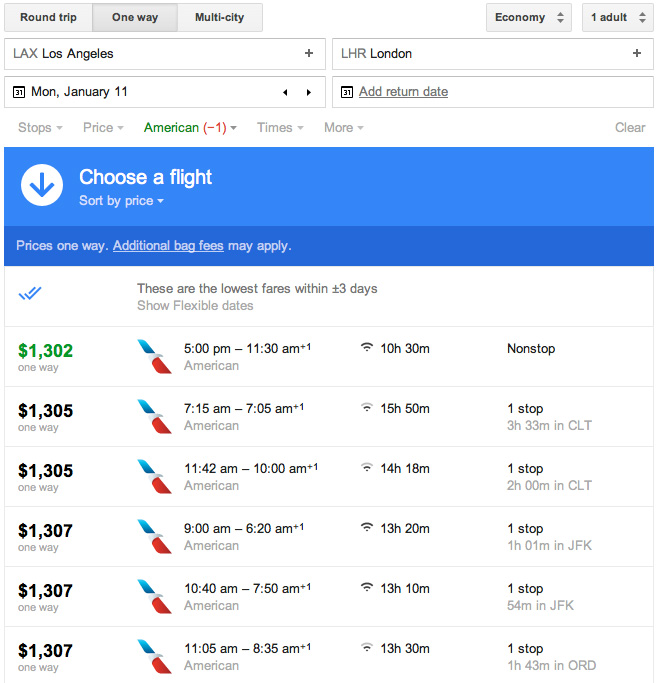
Getting complex with the airline filter.
Using the new checkboxes we can get fairly intricate with our filtering. Here’s another example of a search for flights from Los Angeles to Frankfurt. If I turn on the checkmark next to Lufthansa without filtering anything else, I’ll get several other codeshares, including United and Swiss Air. If I don’t mind traveling on Swiss (or even buying a Swiss ticket and flying Lufthansa) but I don’t want to fly United to Europe, I can set my filter to include Lufthansa and Swiss, but exclude United.
This setting will find flights marketed or codeshared on Lufthansa and Swiss, but not United, as seen in these results…
By the way, unrelated to the airline filter, you’ll also notice on the right side of these results are the new amenity thumbnails. They’re only available for a few select airlines right now, but you can click on them to see items like baggage fees and inflight meals.
Google could have simply offered the option to turn codeshares on or off, but by making airline filter checkboxes instead, they’ve given us many more options. Google Flights isn’t perfect and it still can’t beat ITA Matrix when it comes to pure searching power. But if Google continues to put out improvements like this, 2016 should be a very good year.
Other Recent Posts From The “Bet You Didn’t Know” Series:
3 Methods To Transfer Avios Between Iberia and British Airways
Updates on Amex Offers Auto Tweets & the Virgin Visa Shopping Cart Trick
24 Hour Cancellation Policies For Award Tickets
Find all the “Bet You Didn’t Know” posts here.




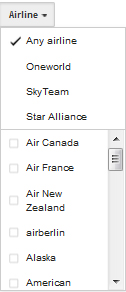
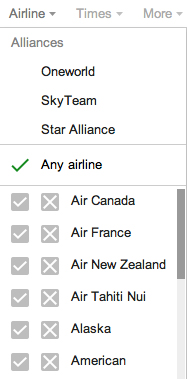
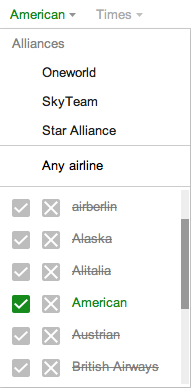
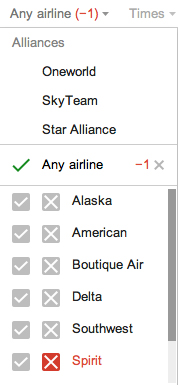
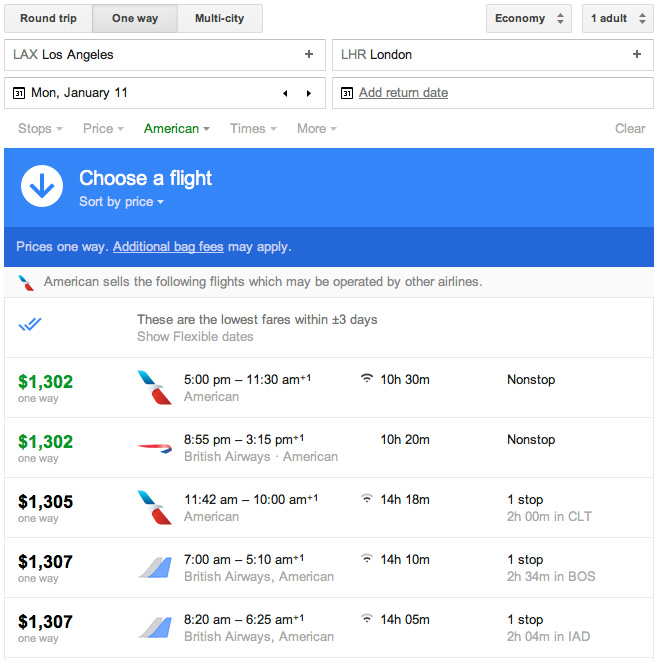
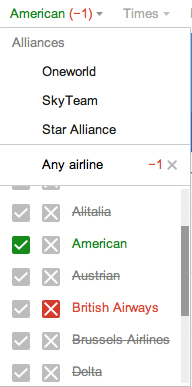
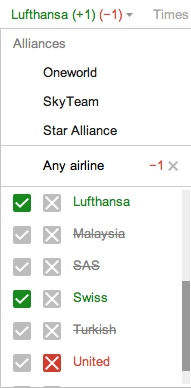
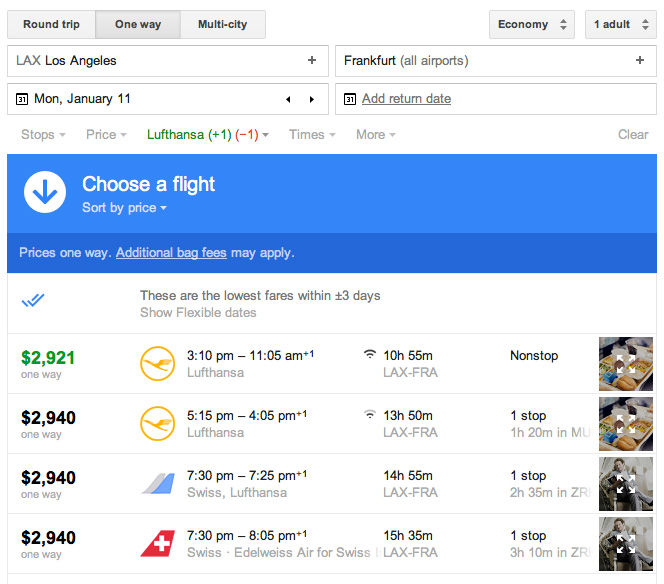
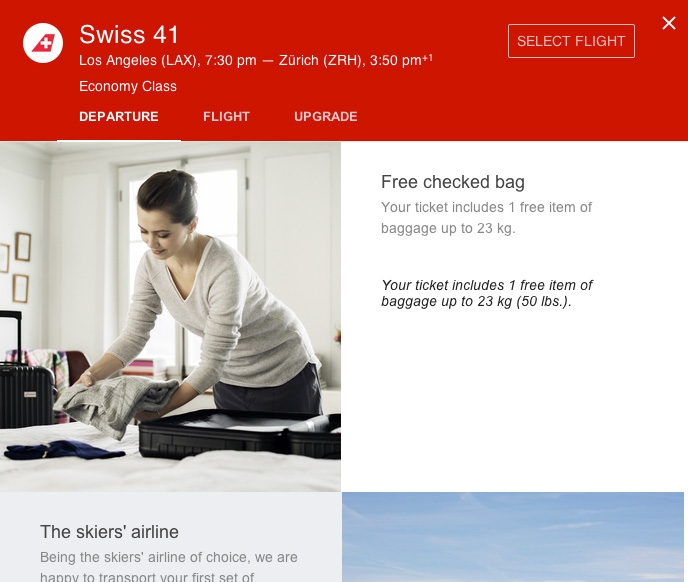
![How to use Google Flights to find great deals [Video] how to use Google Flights to find great deals](https://frequentmiler.com/wp-content/uploads/2024/10/how-to-use-Google-Flights-to-find-great-deals-218x150.jpg)


[…] A Little Noticed Improvement to Google Flights […]
[…] Bet You Didn’t Know: A Little Noticed Improvement to Google Flights – Google continues to tweak and improve their flight search engine making it one of the best products around. […]
[…] A Little Noticed Improvement to Google Flights (The Frequent Miler) and Use Google Flights to Search for Train Times & Prices in Europe (Travel with Grant). […]
[…] Google Flights keeps improving. Still not a match with ITA Matrix, which is also owned by Google. Not sure what the long term plans for both products are, I think one day we will wake up and ITA Matrix will be gone and redirected to Google Flights. Or maybe I way off base here. Please correct me if I am wrong! […]
[…] Advocate from Frequent Miler points out a recent change that makes picking the ideal flight even easier: the option to include […]
“Grant’s a good kid, by the way, which is why I’m stealing his image below. Courtesy of “Travel With Grant.” Used without permission.”
…
Sarcastic bullying is just a less funny version of bullying.
It’s ok. I had drinks with Julian at FTU Advanced Newport Beach a few weeks ago and I told him he could steal/borrow any of my images whenever he wants 🙂
How on Earth do you see this as being bullying?
I use google flights; I notice some searches result in “book through a travel agent,” as opposed to booking through the airline (and the link to take you there). This is rather frustrating; it’s as if the flights exist, but you won’t be able to book via the airlines. Some of the fares (thinking Delta, specifically) are cheaper, but again it directs you to a travel agent (or a $35 airline agent call).